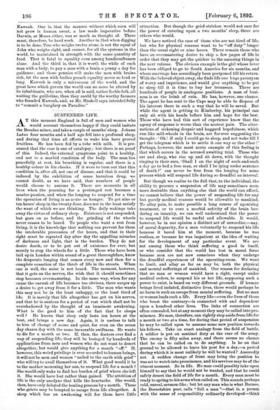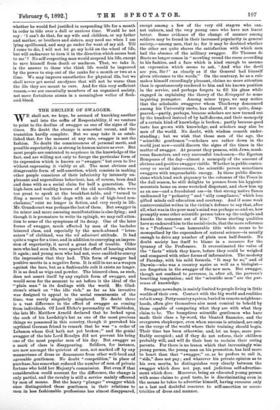SUSPENDED LIFE.
AT this moment England is full of men and women who would account themselves happy if they could imitate the Breslau miner, and take a couple of months' sleep. Johann Latus four months and a half ago fell into a profound sleep, and during that time all efforts to wake him have proved fruitless. He has been fed by a tube with milk. It is pre- sumed that the case is one of catalepsy ; but there is no proof of this. Indeed, the external symptoms point to a healthy, and not to a morbid condition of the body. The man lies peacefully at rest, his breathing is regular, and there is a healthy colour in his cheeks. If it were to turn out that this condition is, after all, not one of disease, and that it could be induced by the exhibition of some harmless drug, we cannot doubt, as we have said, that numbers of people would choose to assume it. There are moments in all lives when the yearning for a prolonged rest becomes a master-passion, and when the longing to suspend for a time the operation of living is as acute as hunger. To get nine or ten hours' sleep in the twenty-four, does not in the least satisfy the want of which we are thinking. The daily wakings take away the virtue of ordinary sleep. Existence is not suspended, but goes on as before, and the grinding of the wheels never ceases to be heard. To people who want a rest from living, it is the knowledge that nothing can prevent for them the intolerable procession of the hours, and that in their sight must be repeated day after day the appalling miracles of darkness and light, that is the burden. They do not desire death, or to be put out of existence for ever, but merely to stop the wheels for a little. Those who have been laid up in London within sound of a great thoroughfare, know the desperate longing that comes every now and then for a complete cessation of the throb of life in the streets. When one is well, the noise is not heard. The moment, however, that it gets on the nerves, the wish that it should sometimes stop becomes overmastering. In the same way, when for any cause the onrush of life becomes too obvious, there surges up a desire to get away from it for a little. The man who wants this may not be in the least unhappy, or the least tired of life. It is merely that life altogether has got on his nerves, and that he is anxious for a period of rest which shall not be overshadowed by the thought of an imminent awakening. What is the good to him of the fact that be sleeps well ? He knows that sleep only lasts ten hours at the best, and brings a new day. Again, it is useless to talk to him of change of scene and quiet, for even on the ocean day chases day with the same inexorable swiftness. He wants to die for a month or two. If, then, the doctors ever find a way of suspending life, they will be besieged by hundreds of applications from men and women who do not want to deiert altogether, but would give anything for a month "off." If, however, this weird privilege is ever accorded to human beings, it will not be men and women "nailed to the earth with grief " who will try to avail themselves of it. What good would it be to the mother mourning her son, to suspend life for a month ? She would only wake to find her burden of grief where she left it. She would have lost rather than gained. The attrition of life is the only anodyne that kills the heartache. She would, then, have only delayed the healing process by a month. Those who grieve may be tempted to escape from life altogether. A sleep which has an awakening will for them have little
attraction. But though the grief-stricken would not care for the power of entering upon a two months' sleep, there are others who would.
We have noticed the case of those who are not tired of life, but who for physical reasons want to be "off duty" longer than the usual eight or nine hours. There remain those who have an overmastering desire to skip a. few pages of life in order that they may get the quicker to the amusing things in the next volume. The obvious example is the girl whose lover has been obliged to go to South America for six months, and whose marriage has accordingly been postponed till his return. With the beloved object away, she finds life one huge paroxysm of worry and impatience, and would give anything to be put to sleep till it is time to buy her trousseau. There are hundreds of people in analogous positions. A man of busi- ness is on the brink of ruin. He has, however, one chance. The agent he has sent to the Cape may be able to dispose of his interest there in such a way that he will be saved. But while the agent is getting to Kimberley, his principal can only sit with his hands before him and hope for the best. Those who have had this sort of experience know that the agony of suspense is worse than the acutest pain. The alter- nations of sickening despair and haggard hopefulness, which run like mill-wheels in the brain, are for ever suggesting the thought : Oh ! if only I could go to sleep, and not wake till I get the telegram which is to settle it one way or the other !' Perhaps, however, the most acute example of this feeling is that which occurs in the accused awaiting trial. Those who eat and sleep, who rise up and sit down, with the thought ringing in their ears, Shall I on the night of such-and-such a day go to bed a free man, or shall I be lying under sentence of death P' can never be free from the longing for some process which will suspend life during so dreadful an interval.
But though we realise to the full that, to the individual; the ability to procure a suspension of life may sometimes seem more desirable than anything else that the world can afford, we cannot believe that the power of suspending life for any but purely medical reasons would be allowable to mankind. To allay pain, to make possible a long course of agonising treatment, or to cure a morbid activity of the brain bor- dering on insanity, we can well understand that the power to suspend life would be useful and allowable. It would, however, be in our opinion a distinct act of cowardice,—nay, of moral depravity, for a man voluntarily to suspend his life because it bored him at the moment, because he was restless, or because he was impatient at the idea of waiting for the development of any particular event. We are not among those who think suffering a good in itself, or who consider that the world has lost in moral force because men are not now conscious when they undergo the dreadful experiences of the operating-room. We want to limit, and allay as far as may be, both the physical and mental sufferings of mankind. Our reason for declaring that no man or woman would have a right, except under medical orders, to suspend his or her life, supposing such a power to exist, is based on very different grounds. If human beings lived isolated, distinctive lives, there would perhaps be no harm in such an escape from mental suffering. But no man or woman leads such a life. Every life—even the lives of those who boast the contrary—is connected with and dependent upon a hundred other lives. The links of connection are often concealed, but at any moment they may be called into pro- minence. No man, therefore, can rightly step aside from life for a month or two at a time, for during that period of suspension he may be called upon to assume some new position towards his fellows. Take an exact analogy from the field of battle. A soldier is put on sentinel duty at the rear of the army. The enemy is fifty miles away, and there seems no chance that he can be called on to do anything. Is he on that ground to be allowed to leave his post for a day,—a period during which it is most unlikely he will be wanted ? Assuredly not. A sudden change of front may bring the position he was set to watch into prominence, and his services may be of the utmost moment. So in life. No man could possibly take upon himself to say that he would not be wanted, and that he could safely desert the field of life for a month. Every man must be ready to spring to his arms when called on. This sounds perhaps cold, unreal, sermon-like ; but let any man who is what Barnes, the Dorsetahire poet, calls " full a man "—that is, a person with the sense of responsibility ordinarily developed—think .whether he world feel justified in suspending life for a month in order to tide over a dull or anxious time. Would he not say : can't do that, for my wife and children, or my father and mother, or brothers and sisters, may need me when I am lying spellbound, and may go under for want of my aid. Till I come to die, I will not let go my hold on the wheel of life, but will endeavour to turn it in the direction which seems best to me' ? No self-respecting man would suspend his life, except to save himself from death or madness. That, we take it, is the answer to those who think life would be improved by the power to step out of the ranks for a month or two at a time. We may improve anaesthetics for physical ills, but we shall never get moral anodynes that will not be worse than the ills they are meant to cure. And for this very sufficient reason,—we are essentially members of an organised society, not mere fortuitous atoms in a meaningless welter of flesh- and-blood.







































 Previous page
Previous page